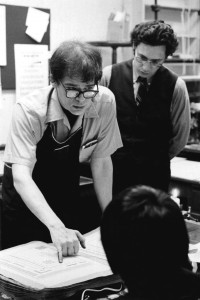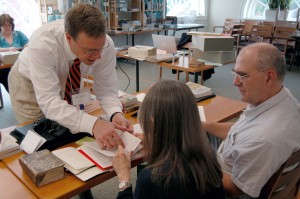A Brief History of RBS

Terry Belanger at the Book Arts Press, c.1974
Terry Belanger founded Rare Book School (RBS) at Columbia University under the aegis of the Book Arts Press (BAP), the bibliographical laboratory he established at the School of Library Service in 1972.
Created in 1983, RBS began as a collection of non-credit courses on bookish and bibliographical subjects, aimed at working professionals and other persons interested in the history of books and printing. The first summer session of RBS offered eight five-day courses on subjects similar to those still offered today. In 1984, RBS expanded to 20 courses. In 1992, the School moved from Columbia in New York to the University of Virginia in Charlottesville, where it was given a suite of rooms on the first floor of Alderman Library, as well as space for its collections in the Dome Room of the University’s Rotunda, the principal building of Thomas Jefferson’s “academical village.”
Over the years, RBS has continued to expand its operations and deepen its mission with respect to the study, care, and management of print-related technologies and cultures. In 1999, the School received its first major bequest when Robert Dougan left RBS $50,000 in his will; this gift allowed the School to establish an endowment. In the following year, the School created its first scholarship program with contributions given to RBS in memory of a beloved summer staff member, James Davis, who unexpectedly died in February 2000. Meanwhile, books, prints, and other in-kind gifts continued to arrive. As the School’s resources expanded, RBS sought charitable non-profit status; in 2002, RBS received 501(c)(3) designation from the IRS, enabling the School’s Board of Directors to assume direct ownership of and responsibility for the School’s assets, which had previously been held in trust for RBS by UVA’s tax-exempt Virginia Fund.
Over time, it became increasingly clear that RBS was not just a collection of non-credit courses on bookish and bibliographical subjects, but the mainstay of bibliographical education in the United States and the English-speaking world. Schools designed on the RBS model began to appear in 2001 with the Book History Workshop in Lyons, France, followed by the Australasian RBS (2005) and California Rare Book School, which began in August 2006. The first London Rare Books School ran in July 2007 at the University of London’s Institute of English Studies.
In 2005, RBS’s own course venues expanded to include the Morgan Library & Museum and the Grolier Club in New York City, the Walters Art Museum in Baltimore, and the Freer|Sackler Galleries at the Smithsonian Institution in Washington, DC. This expansion in programming was indirectly supported through the Institute of Museum and Library Services (IMLS), which, in May 2005, granted RBS $122,250 to underwrite 150 full-tuition scholarships, to be awarded approximately 50 per year for each of the following three years. The grant provided by IMLS allowed an unprecedented number of those new to the fields of rare books and librarianship to continue their professional training by attending RBS. That same year, under the leadership of its first Chair, Hans Tausig, the RBS Board began a fundraising campaign to increase its endowment. In June 2006, the School was awarded a $1 million 3-to-1 match Challenge Grant by the National Endowment for the Humanities, which provided RBS with $333,333 towards its endowment. The School was able to meet the grant, in part owing to the bequest of its dear friend and great benefactress, Mary Ann O’Brian Malkin. RBS’s founding director, Terry Belanger, won a $500,000 MacArthur Grant in 2005—much of which he also contributed towards the School and its endowment. In 2009 the School’s friends, faculty, and alumni generously gave more than $110,000 for the establishment of a Directors’ Scholarship Fund to honor Belanger, who stepped down as the School’s director in August of 2009, and to mark the arrival of his successor, Michael F. Suarez, S.J.

Michael F. Suarez, S.J. teaches in the Byrd/Morris Seminar Room, 2014
Since 2009 RBS has continued to expand scholarship and fellowship opportunities, thanks to the support of the Gladys Krieble Delmas Foundation and partnerships with several bibliophilic organizations. A 2011 grant from the Jefferson Trust, an initiative of the UVA Alumni Association, allowed RBS to award RBS-UVA Fellowships to undergraduate and graduate students at UVA; this program continues with the support of generous benefactors. Beginning in 2012, RBS received four substantial awards from the Andrew W. Mellon Foundation to fund the Mellon Fellowship of Scholars in Critical Bibliography, a program designed to reinvigorate bibliographical studies by providing focused training and mentorship for doctoral candidates, postdoctoral fellows, and junior faculty in the humanities. In 2014 RBS was awarded a $279,000 IMLS grant to fund a fellowship program to help educate and contribute to the professional development of early-career special collections librarians, with a special emphasis on recruiting participants currently underrepresented in the field. Scholarships specifically designated for artists and artisans of the book, as well as the William T. Buice III Scholarships for returning RBS students, were first awarded in 2014.
In 2013 RBS completed a two-phase, $1 million renovation, creating three new seminar rooms, a printing office, a reception suite and gallery, collections storage, and staff work spaces. RBS has also continued to increase its satellite course offerings, with sessions at the University of Pennsylvania, the Library Company of Philadelphia, Yale University, the Folger Shakespeare Library, the Lilly Library, the Library of Congress, Amherst College, the Free Library of Philadelphia, the Grolier Club, the Morgan Library & Museum, and the Thomas J. Watson Library at The Metropolitan Museum of Art.
In 2022, Rare Book School moved back into UVA’s newly renamed Edgar Shannon Library upon the completion of a $160 million renovation. RBS’s new second-floor suite includes state-of-the-art classrooms, adjacent staff offices, exhibition space, and expansive storage areas for teaching collections and printing equipment.
As the School’s mission has expanded, so has its staff. We are well poised to meet the School’s goals for implementing its mission of education, advocacy, and outreach.
